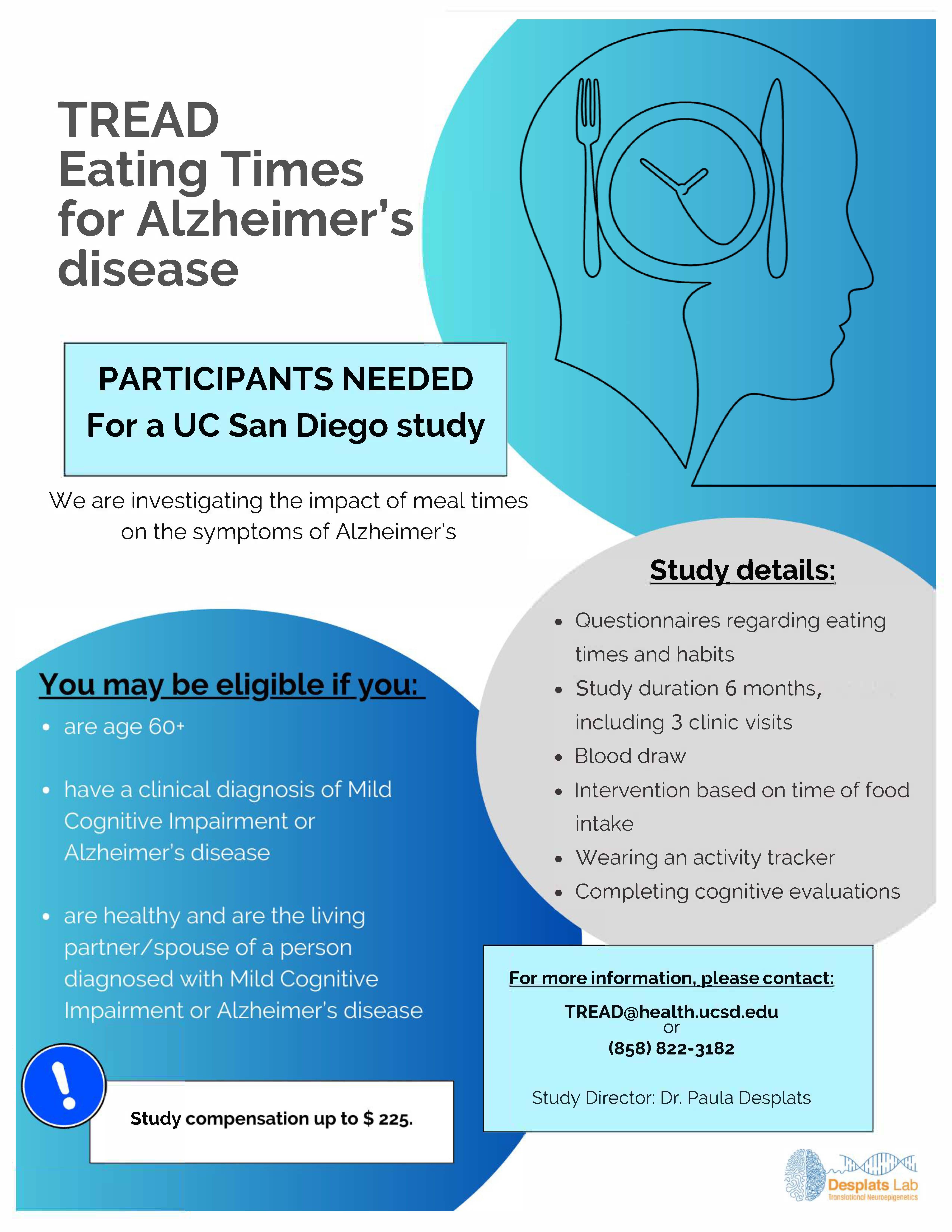Intervention Studies (Clinical Trials)
About Clinical Trials
An interventional study, or clinical trial, is a research study in which a human subject is assigned to one or more interventions (which may include an investigational drug, placebo, or other control) to evaluate the effects of those interventions on health-related or behavioral outcomes.
Clinical Trials for Persons with Normal Cognition, Mild Cognitive Impairment (MCI), Early Alzheimer's Disease, and Other Dementias
The ADRC Clinical Trials Unit has a variety of clinical trials available for participants with Alzheimer's disease and related dementias. We continue to add new studies to our portfolio regularly and encourage individuals who are interested in participating to reach out to our team at the ADRC.
See below for studies currently in the pipeline that will be starting recruitment in the near future or download the clinical trials flyer (PDF) for more information.
TREAD: 'TREAD Eating Times for Alzheimer's Disease
| Study Name | TREAD Eating Times for Alzheimer's Disease | |
| Study Summary |
The purpose of this study is to investigate the safety, feasibility, and effectiveness of prolonged night fasting in reducing cognitive decline and disease markers in patients with mild cognitive impairment (MCI) or early to moderate Alzheimer’s disease (AD). Participants will follow a time-restricted eating (TRE) model of prolonged fasting during the night for 6 months. We will monitor blood-based markers of health, metabolism, aging, and AD pathology; record circadian regulation based on sleep and activity monitoring and evaluate cognitive functions over the course of 3 clinic visits. |
|
| Principal Investigator(s) | Paula Desplats Ph.D. | |
| Required Diagnosis | Mild Cognitive Impairment (MCI), early stage Alzheimer's disease (AD) OR are healthy and are the living partner/spouse of a person diagnosed with Mild Cognitive Impairment or Alzheimer's Disease | |
| Age | 60 or older | |
| Length | 6 months | |
| Lumbar Puncture | No | |
| MRI | No | |
| Amyloid PET | No | |
| Tau PET | No | |
| Compensation | Yes; up to $225 for completion of all study visits and procedures | |
| Contact | ||
| For More Information |
|
|
|
|
|
|
| PodCast Episode |
Southern Caregiver Resource Center Podcast: Let's Talk Caregiving featured Dr. Desplats discussing AD Research and this project. Click here to listen |
Brain Derived Neurotropic Factor
| Study | BDNF |
| Study Description | This is an open label, Phase I, first-in-human clinical trial of AAV2-BDNF gene therapy for early Alzheimer’s Disease (AD) and Mild Cognitive Impairment (MCI). The primary aim is to determine whether administration of the nervous system growth factor “Brain-Derived Neurotrophic Factor” (BDNF) to eligible patients with AD and MCI is safe and tolerable. BDNF will be administered via gene therapy using a MRI guided stereotaxic approach which has shown to be safe and effective in animal studies. This study will be used to determine whether BDNF administration reduces neuronal loss and rebuilds synapses in the brain of patients with AD and MCI. |
| PI | Gabriel Leger, M.D. |
| Main Requirements | People who participate in this gene therapy study must have a confirmed diagnosis of early Alzheimer's disease and be otherwise healthy. The following requirements are necessary to be considered for enrollment in this research trial: 1) A neurologist-certified diagnosis of "Probable Alzheimer's Disease" or “Mild Cognitive Impairment”. 2) Early stage of the disease (generally within 2-4 years of diagnosis). 3) Completely normal speaking ability and completely normal ability to understand what others are saying. 4) An ability to understand the potential risks of participation in this study (described in more detail below). 5) Must be willing to stay in the San Diego area and be available for up to 10 visits in the first year. |
| Required Diagnosis | MCI or probable mild AD |
| Age | Minimum 50 |
| Length | 2 years |
| Lumbar Puncture | 3 times |
| MRI | Required |
| Amyloid PET | Required |
| Tau PET | No |
| Compensation | No - travel cost reimbursement only |
| Contact | jar040@health.ucsd.edu, clinicaltrialsadrc@health.ucsd.edu |
| For more information | https://today.ucsd.edu/story/first-in-human-clinical-trial-to-assess-gene-therapy-for-alzheimers-disease https://neurosciences.ucsd.edu/centers-programs/neural-repair/bdnf-gene-therapy-trial.html |
Affiliated Research Groups
Virtual Reality Brain Health Study
| Studies | Virtual Reality Brain Health Study |
| Study Description | The purpose of this study is to use a novel virtual reality (VR) based activity that simultaneously engages physical and cognitive activity aimed at improving brain health and cognition in older adults. We will compare 3 types of activities combined VR physical and cognitive, physical activity only, and VR cognitive activity only over 16 weeks to evaluate changes in brain health, cognition, blood-based biomarkers, and physical function in older adults. |
| PI | Dr. Judy Pa |
| Main Requirements | Between 50 and 85 years of age Fluent in English Can safely ride a stationary bike |
| Required Diagnosis | No diagnosis required |
| Age | 50-85 (inclusive) |
| Length | Approx. 8-9 months including 4 months of active study participation and a follow-up visit 4 months later |
| Lumbar Puncture | No |
| MRI | 2 scans Required |
| Amyloid PET | No |
| Tau PET | No |
| Compensation | Yes |
| Contact | brainhealth@health.ucsd.edu |
| For more information |
https://thepalab.com/participate/ Study Flyer (pdf)centers-programs/adrc/enrolling-studies/clinical-trials/Virtual-Reality-Brain-Health-Study-No-Stamp.pdf |
| QR Code |
Mente Sana/Mind Boost
|
Studies |
Mente Sana/Mind Boost Study |
|
Study Description |
Kaiser Permanente Washington and the University of California San Diego (UCSD) are doing research to learn about different programs to improve the brain health of Hispanic/Latino(a) adults ages 55 and over. We are testing two different programs done independently at home: one is focused on gradually increasing physical activity; the other will focus on learning about healthy lifestyle changes that can help improve brain health. Both programs will be given over 12 weeks. Regardless of which program you end up in, they both fit within your daily life and are personalized to your situation and all activities in the study will be remote and done at your home. We developed the programs to work for people with different levels of ability, fitness, and health conditions. |
|
PI |
Zvinka Zlatar (UCSD) and Dori Rosenberg (Kaiser Permanente Washington) |
|
Main Requirements |
|
|
Required Diagnosis |
Cognitively healthy |
|
Age |
55 to 89 |
|
Length |
~20 weeks (12 weeks of intervention + up to 8 weeks of baseline and post intervention measurement assessments). All done at home. No need to travel anywhere. |
|
Lumbar Puncture |
No |
|
MRI |
No |
|
Amyloid PET |
No |
|
Tau PET |
No |
|
Compensation |
Up to $100 for completing all measurement visits and a Fitbit Inspire device |
|
Contact |
Rosa Gutierrez Aceves at 858-822-7737 |
|
For more information |
contact us at 858-822-7737 |
Research Registry
If you are interested in any of our current studies or you'd like to participate in a study but don't currently see one that is a match for you, join our research registry to be placed on a list for future studies.
For more information contact:
Phone: 858-822-4800Email: participate@ucsd.edu



